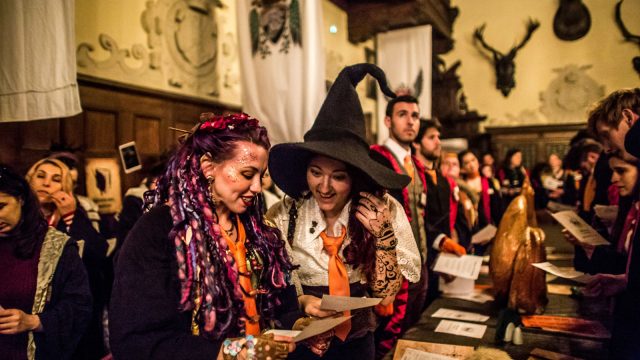Nothing gets created without a lot of hard work behind the scenes. If it’s done right, much of that work remains out of sight, with just the results showing. So with that in mind, please enjoy reading about the culmination, legacy and/or exploitation of others’ labors:
On Kotaku Elizabeth Ballou gives an in-depth account of the Poland-based company Dziobak, an operator of elaborate larping camps based in Harry Potter-esque wizarding worlds which abruptly shut down after years of financial difficulties, poor wages and allegations of sexual harassment.
On March 5, 2019, Dziobak abruptly shut down. To many of the College of Wizardry larpers, the news came as a shock. But to Rain, and to anyone else who had worked with Dziobak, it had always been a question of when, not if, the seemingly robust studio would fold. Allegations of financial mismanagement, worker mistreatment, and sexual harassment had dogged Dziobak and its CEO Claus Raasted for years. Dziobak was no castle built of stone, but a house of cards.
Leigh was really keen on having a man in a green suit interact with Elisabeth throughout the film, because he thought that would make her reactions and physicality a lot stronger than if she were just miming it. So, we needed the ability to shoot perfectly clean plates so that we could erase the man in the green suit in post. That meant I needed the camera moves to be repeatable.
At The Vulture, comedian Gary Gulman shares and comments on all 366 tips for writing jokes that he tweeted out daily throughout 2019. They range from the esoteric to the general helpful for any creative life:
Tip No. 6: Words with the sound “buh,” “puh,” and “kuh,” especially at the beginning/end are funnier. No one knows why. “Buick” is funnier than “Nissan.” I learned this early. I assumed everyone knew. They don’t. Take some soft punch-words and replace them with a b/p/k sound.
At the time Second City was pretty square — a lot of erudite University of Chicago graduates with skinny ties, glasses and clever lines — but Gordon and his crew represented something else entirely. These were cool cats, down from Wisconsin, getting high, getting naked and getting to do whatever crazy stuff on the stage they wanted. And nobody was even close to 30 years old.
And finally, reaching back to a little earlier in the month, a fascinating interview from Abby Sun at MUBI with documentarian Alexander Nanau about what he leaves out of his latest film, about a disaster and an investigation and the repercussions:
NANAU: I just want to make people understand how forces govern lives. Activist stories tend to point a finger and to personalize the sides: he’s the good one, he’s the bad one. The very first scene of Collective shows the parents of victims, who think they’re being lied to. And then you see the fire. And then you hear the propaganda, but we never put faces to it. You hear what the parents had just described what they were told. We didn’t show who was saying the propaganda, and only used the sound because it was more important to understand we have to be aware that no matter who is coming up with such strong statements, “we did everything we managed,” “we’re the best,” we have to question them. If we would have put faces to the politicians who said those things, viewers would singularize the experience.


